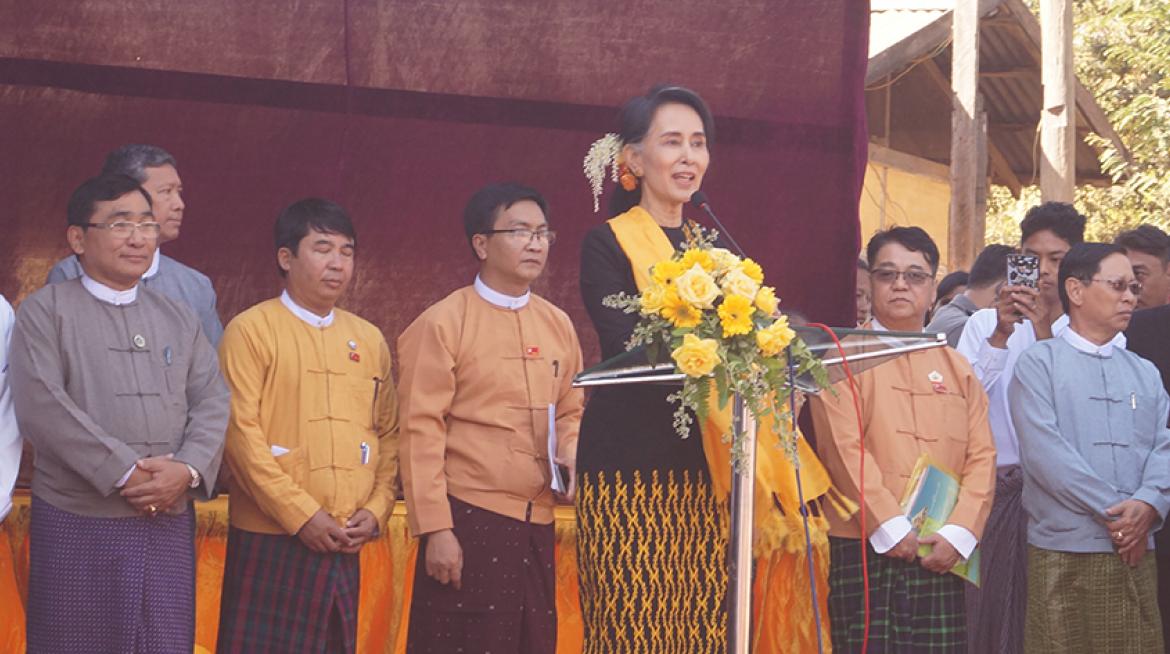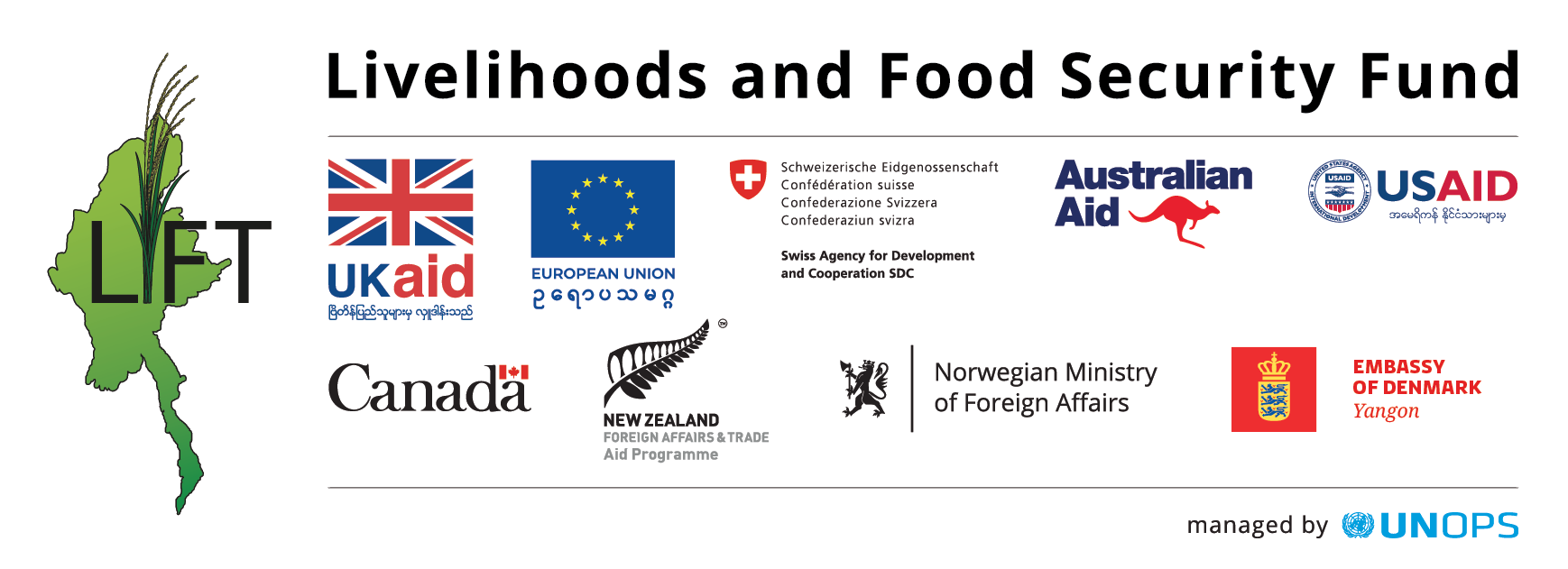
State Counsellor Daw Aung San Suu Kyi chaired the first National Coordination Meeting on Nutrition in Pakokku, Magway Region, on January 25, 2017.
The State Counsellor met with five government ministers, six donor countries, six UN agencies, the World Bank and Non-Government Organisations to discuss how nutrition issues could be tackled with a more coordinated, national approach across sectors.
State Counsellor Daw Aung San Suu Kyi invited ministries, donors and agencies already making important contributions to nutrition in Myanmar to discuss together how to strengthen efforts through coordination and collaboration.
Key outcomes of the Cross-Ministry Coordination Meeting on National Nutrition Strategy are:
- High-level government commitment on the importance of nutrition and its inclusion in national development planning
- Recognition of the importance of good nutrition in the first 1,000 days of a child’s life, and beyond
- The Ministry of Health will convene regular meetings of the cross-sectoral group and include State and Regional representation to continue to discuss coordination on nutrition
- Continue to build a solid base of evidence on nutrition
- Strive to procure goods that support nutrition initiatives locally
Prior to the National Coordination Meeting on Nutrition, State Counsellor Daw Aung San Suu Kyi and the Union Ministers of Health and Sports, Social Welfare, Education, Religious Affairs, and Agriculture, Livestock and Irrigation visited Kyee Village, 15 minutes’ drive from Pakokku where nutrition-focused projects funded by LIFT are run by Save the Children, Myanmar Nurses and Midwives Association (MNMA), PACT Global Microfinance Fund (PGMF) and PATH.
MNMA, Save the Children and PATH briefed the State Counsellor and ministerial delegation on the importance of reaching children with good nutrition during the first 1,000 days of life – from conception through to the child’s second birthday. It is critical children receive good nutrition in this 1,000 day window to avoid stunting and its long-term impacts on the child’s life and potential.
MNMA teaches mothers and families about what they need to do to deliver good nutrition, hygiene and health to their infants and children.
To support women in providing good nutrition in the critical first 1,000 day window PGMF delivers Maternal and Child Cash Transfers (MCCT) to mothers. The cash enables women to act on what they learn about good nutrition and feed themselves and their children the food they need for healthy development.
PATH promotes and distributes rice fortified with micronutrients. Save the Children provides technical assistance to support these nutrition-raising activities.
The State Counsellor visited several mothers with young children in their homes in Kyee village to discuss nutrition before returning to the Monastery compound where she held a town hall-style meeting with about 500 villagers for 15 minutes before departing for Pakokku for the National Coordination Meeting on Nutrition.
Gavin McGillivray, on behalf of the UK’s Department for International Development (DFID) in Myanmar, which chairs the Livelihoods and Food Security Trust Fund (LIFT) and 3MDG Fund Boards, said he and other development partners welcomed Daw Aung San Suu Kyi’s lead on organising the first National Coordination Meeting on Nutrition.
Mr McGillivray said the Ministries of Health and Sports, Social Welfare, Education and Agriculture, Livestock and Irrigation all had ongoing interventions on nutrition that were making a difference, including the Department of Social Welfare’s plan to introduce universal MCCT in Chin State.
“There are forums existing like the Scaling Up Nutrition (SUN) Movement, the UN Network for Nutrition and Food Security and the Development Partner Nutrition Network and there is a real appetite among development partners to align behind a Government vision to improve nutrition for all of the people in Myanmar.”
LIFT Donor Consortium Chair and European Union representative Claudia Antonelli said supporting good nutrition of mothers and children in the first 1,000 days of a child’s life was one of the most significant nutrition initiatives in Myanmar and this was reflected in the policies of all actors on nutrition.
“Resources need to be concentrated in the first 1,000 day window if we are going to effect change on nutrition in Myanmar because the evidence clearly tells us that when children do receive good nutrition in the first 1,000 days of their lives they are 10 times less likely to die of childhood disease, will complete more grades at school and earn up to 21% more as a result as adults,” Ms Antonelli said.
“Undernutrition, particularly in women and children, has devastating and long-term effects on families and communities. Stunting in children, which is caused by chronic and sustained undernutrition, has long-term effects on a child’s development and economic potential. Poor nutrition is linked to 45% of child deaths,” Ms Antonelli said.
“There is solid evidence from around the world that when governments address nutrition of women and children across sectors at a national level that’s when results are really achieved,” Ms Antonelli said.
Myanmar has one of the highest rates of stunting in children under 5 years old in ASEAN and micronutrient deficiency is widespread. Preliminary results from Myanmar’s 2015 Demographic Health Survey show that 29% of the country’s children under 5 years old are stunted.
Micronutrient deficiencies are widespread in Myanmar and iron deficiencies in both children aged 6-59 months (57%) and women aged 15-49 years (47%) is considered severely high.
At the Pakokku meeting Union Ministers, development partners and the National Nutrition Centre addressed the meeting before an open discussion on how to effectively address nutrition in Myanmar in the coming years was held.
Participating in the discussions were Minister of Agriculture, Livestock and Irrigation Dr Aung Thu; Minister of Education Dr Myo Thein Gyi; Minister of Health and Sports Dr Myint Htwe; Minister of Social Welfare, Relief and Resettlement Dr Win Myat Aye; Minister of Religious Affairs and Culture Thura U Aung Ko: Magway Region Chief Minister Dr Aung Nyo Nyo and representatives of WFP, FAO, UNICEF, WHO, UNFPA, UNOPS, the National Nutrition Centre, Save the Children, PATH, LIFT and 3MDG.
Representatives from six donor countries – the United Kingdom, the European Union, Australia, Switzerland, Denmark and the United States of America – participated in the meeting.
Improving nutrition is one of LIFT’s four major desired outcomes. Maternal and child cash transfers of USD 14.5 million are being implemented by LIFT with more than 54,000 mothers and children enrolled.
Due to LIFT programmes 196,000 households have improved diets and 2.1 million people have increased their food security by more than one month.
LIFT-funded nutrition programmes implemented in three Dry Zone townships, including Pakokku, will reach 11,000 pregnant women across 370 villages. LIFT also funds nutrition programmes in Rakhine State and the Ayeyarwady Delta. Nutrition programmes in Chin State will begin in 2017.


